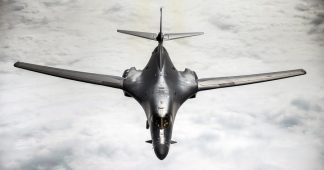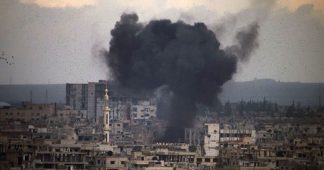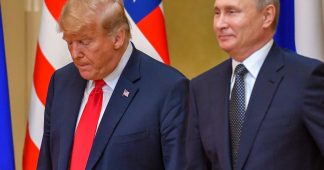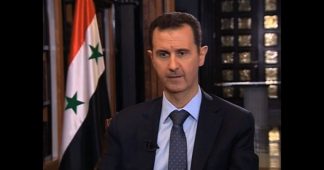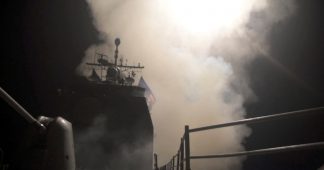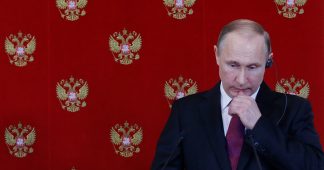Is Washington on the brink of a major attack on Syria?
By Bill Van Auken
28 August 2018
The US and its allies are systematically putting into place all the elements needed to justify and carry out a major new act of aggression against Syria, according to reports from Moscow and the Middle East.
The charges that Washington is preparing an unprovoked attack followed warnings made by US National Security Adviser John Bolton, as well as by British and French officials, that their governments would retaliate sharply against any use of chemical weapons by the government of President Bashar Assad in the northern Syrian province of Idlib.
Recent bombing and shelling by the Syrian military, as well as the reported transfer of the Syrian army regiment based in the city of Homs to the southern border of Idlib, have raised speculation that Damascus is on the verge of launching an offensive to retake one of the last territories still under the control of Al Qaeda-linked Islamist militias. These forces were armed and funded by Washington, Turkey, Saudi Arabia and Qatar to wage a seven-year-long proxy war for regime change aimed at installing a more pliant pro-imperialist regime in Damascus.
The Assad government has denied employing chemical weapons in its campaign to reassert control over areas of the country seized by the Western-backed “rebels.” It has accused the Al Qaeda-linked forces of staging chemical weapons incidents with the aim of provoking US military attacks on the regime, like the ones carried out last April and in 2017.
Speaking at a press conference in Jerusalem last Wednesday, Bolton declared: “We are obviously concerned about the possibility that Assad may use chemical weapons again. Just so there’s no confusion here, if the Syrian regime uses chemical weapons we will respond very strongly and they really ought to think about this a long time.”
The US national security adviser also made the case for the more aggressive US assault on Iran, which has included the abrogation of the 2015 nuclear agreement reached between Tehran and the major powers, along with the re-imposition of punishing economic sanctions.
Bolton claimed that Washington’s aim was not regime change in Tehran, but rather a “massive change in the regime’s behavior.” At the same time, he made it clear that the purpose of the economic sanctions was to create intolerable conditions for the masses of the Iranian people, leading to social upheavals.
He also spelled out areas where the Pentagon is preparing for confrontation with Iran. “Iranian activity in the region has continued to be belligerent: what they are doing in Iraq, what they are doing in Syria, what they are doing with Hezbollah in Lebanon, what they are doing in Yemen, what they have threatened to do in the Strait of Hormuz,” he said.
Bolton followed up his trip to Israel with a meeting in Geneva with his Russian counterpart, Nicolai Patrushev, apparently in an attempt to enlist Russian assistance in Washington’s campaign against Iran. Publicly, at least, Moscow appeared to rebuff the approach. Russian Foreign Minister Sergei Lavrov demanded that all military forces not invited into Syria by the government leave the country, a clear attempt to distinguish between Tehran and Washington.
US officials have made clear that while Washington’s objective in Syria remains the toppling of the Assad regime, it is also focused on the driving out of Iranian forces from the country as part of its strategy of rolling back Iranian influence throughout the Middle East and clearing the path for the assertion of US hegemony in the oil-rich region.
Iran has rejected US and Israeli demands that it abandon Syria, insisting its forces have been invited into the country by the government in Damascus, unlike the 2,200 US troops there, which have been deployed in direct violation of international law.
Iran’s Defense Minister Amir Hatami and his Syrian counterpart announced on Monday the signing of a “defense and technical agreement” that provides for the continued “presence and participation” of Iran in Syria.
“We hope to have a productive role in the reconstruction of Syria,” Hatami said during his visit. Tehran had previously committed to building 20,000 housing units for returning refugees. The Trump administration, meanwhile, has canceled $230 million that had been earmarked for Syrian “stabilization” and has made it clear that it will provide nothing for reconstruction of the vast majority of the country that is now under government control.
To achieve its strategic aims in Syria and the broader Middle East, Washington is driven to intensify its military intervention.
The Russian government has claimed that it has intelligence establishing that British trained “specialists” have been sent into Idlib for the purpose of staging a “chemical attack” designed to provide the pretext for US, British and French strikes on the Syrian government.
“The execution of this provocation with active participation of British security services is supposed to serve as yet another pretext for delivering a missile and aviation strike by the US, the United Kingdom and France on Syria’s government and economic facilities,” Maj. Gen. Igor Konsashenkov, the spokesman of the Russian Defense Ministry said on Monday.
Konsashenkov pointed to the deployment of the US guided missile destroyer USS The Sullivans, armed with 56 cruise missiles, to the Persian Gulf, as well as the transfer of a B-1B bomber carrying 24 cruise missiles to the Al Udeid Air Base in Qatar as indications that Washington is preparing for a major strike on Syria.
He cited reports from the Middle East that the Islamist militia Hay’at Tahrir al-Sham (previously known as the Al Nusra Front, the Syrian affiliate of Al Qaeda) had “brought eight containers with chlorine to the city of Jisr ash-Shugur in the Idlib governate…” in preparation for a staged chemical weapons incident.
The timing of a US assault on Syria may be influenced by the announced plan for a September 7–8 summit in the northern Iranian city of Tabriz, bringing together Iranian President Hassan Rouhani with his Russian and Turkish counterparts, Vladimir Putin and Recep Tayyip Erdogan, for talks aimed at achieving a negotiated settlement of the Syrian conflict.
Turkey is opposed to a Russian-backed offensive against Idlib, where it has provided support to some of the “rebel” groups. At the same time, however, it has come into increasing conflict with the US, intensified by recent trade sanctions, and has drawn closer to Moscow and Tehran.
Washington is vehemently opposed to any resolution of the seven-year-old war in which it does not dictate the terms.
A further incentive for launching a major escalation of the US war in Syria is the domestic political crisis of the Trump administration, which has confronted a tightening legal noose with last week’s plea agreement with Michael Cohen, his former lawyer, and the conviction the same day of Paul Manafort, his former campaign manager, as well as the announcement of immunity deals with two of the US president’s closest associates, Trump Organization CFO Allen Weisselberg and National Enquirer publisher David Pecker.
The Democratic Party and decisive layers within the ruling establishment have centered their opposition to Trump on the question of confronting Russia, the sharp edge of which centers on US policy in Syria.
In an editorial published Saturday titled “Trump is getting in his team’s way on Syria,” the Washington Post sharply criticized the US president for failing to pursue a more aggressive military policy in the ravaged Middle Eastern country, while praising various officials within his administration for affirming that US troops will remain in the country and asserting a policy of confrontation with both Iran and Russia.
“Any US strategy in Syria would face steep obstacles, including the machinations of Russia, which claims to want to restrain the regime and remove the Iranians, but, in practice, abets both,” the editorial stated. “Yet the unique problem with this US policy is that it is at odds with the stated positions of President Trump. Mr. Trump has repeatedly and bluntly declared that he wishes to withdraw US forces from Syria as soon as possible…
“What all sides in Syria perceive is not only a lack of US resolve. They also see an administration that hasn’t been able to formulate a clear strategy to defend American interests—thanks to the poor judgment of the president.”
The launching of a major US military escalation in Syria would provide Trump with the means of blunting the attacks on his presidency. At the same time, it would raise the risk of a military confrontation that could quickly escalate into a region-wide and global war.
